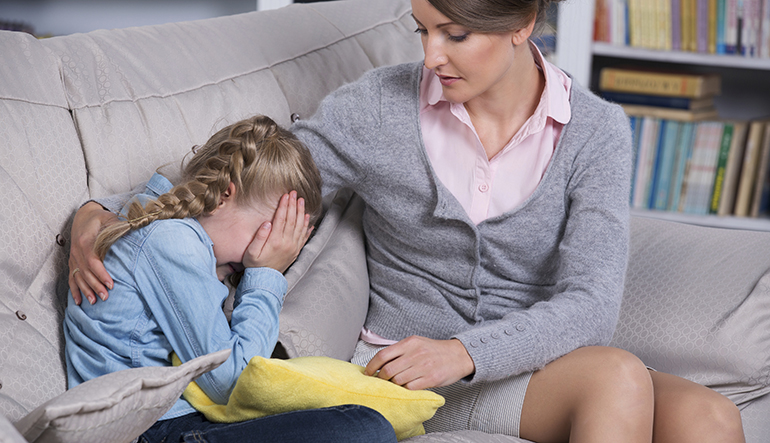
Going back to school can cause anxiety for children. Parents share how they learned to support their children.
Lindsay was six years old that September when her parents noticed she was behaving differently than usual. Her mom, Marilyn, remembers how mystified she and her husband were by their daughter’s new-found tendency to throw tantrums, to complain of assorted aches and pains and to try to avoid going to school.
“We noticed that our child, who loves school, has good friends, is bright, loves to read, and is very creative, started having these emotional outbursts. The tiniest thing would send her into a meltdown,” says Marilyn.
Not only was it the see-saw of emotions that was upsetting, but Lindsay’s behavior was also distinctly odd, says her mom. She was making it clear she didn’t want to go to school. “It was next to impossible to get her out of bed in the morning. We make sure that our kids get between 10 and 11 hours of sleep each night, but she was difficult to get up even if she went to bed early.”
Marilyn and her husband were also worried about Lindsay’s physical complaints. “That month of September she had a whole lot of tummy pain, or she would be complaining about leg pain or headaches,” Marilyn observed. All of these concerns merited a visit to their family doctor.
Their family doctor in Port Coquitlam ran some tests, which revealed that Lindsay had no physical illnesses. By October, all of her symptoms had vanished. Both busy working parents, Marilyn and her husband were much relieved – until Lindsay’s symptoms reappeared the following September. They started to suspect that the real source of illness for Lindsay was anxiety about going back to school.
Each time Lindsay complained about not wanting to go to school, Marilyn took the time to hold that moment for Lindsay. As a result, Marilyn uncovered some of her daughter’s fears. They turned out to be fears of the unknown – Who’s my teacher going to be? Who’s going to be in my class? What if I don’t know anyone?
Turns out that just like many of us, kids can become victims of the ‘what-if’ questions in life and will need help to cope with them.
Sharing the learnings
From first discovering these signs of anxiety in Lindsay three years ago, to building her daughter’s coping skills, Marilyn has come a long way. Now, she wants to share her experience to help other parents detect and manage the back-to-school anxiety that occurs in one in seven children in British Columbia.
Times of transition provoke anxiety and worry in everyone. Experts say children going back to school or new kids coming into elementary school are no exception. Some common worries include: Who will be my new teacher?; What if my new teacher is mean?; Will I understand the new schoolwork?; What if something bad happens to mom or dad while I am at school?; What if I don’t make any friends?
Lindsay’s fears reflected similar concerns. So her parents spent time reassuring her that she was not alone and that they would work through the situation together. “That really helped her,” Marilyn says. Ensuring they maintained their familiar daily routine and highlighted something for Lindsay to look forward to at the end of each day also helped Lindsay manage her anxiety.
“We always have dinner together, read a book together, and then the kids go to bed,” says Marilyn. “Even though to her, everything else in her life was changing at the moment, our daily routines weren’t changing. That and the added incentive that we would do a favourite activity when she got home from school gave her something she could look forward to and focus on.”
Marilyn and her husband were not alone on their journey. They also engaged Lindsay’s teacher and the school counsellor to let them know that Lindsay was experiencing anxiety, so they could be supportive of her.
“We believe in learning from others’ experience, and so in addition to connecting with professionals, we also reached out to other parents whom we respect to get their ideas on what to do,” says Marilyn.
One of those parents was Lina Thompson of Chilliwack, who shared a technique that worked in her situation. “A trick that I have used in my own home is role playing scenarios that cause anxious thoughts, such as what happens if the bus is late or no one is there to pick me up? Role playing is so wonderful for skill building and allowing children to see their own strengths in problem solving,” says Lina.
Helen Edwards, a clinical coordinator of mental health services with Fraser Health, says that although it’s normal for children to have worries about going back to school, it is crucial that they don’t miss school. Staying at home will reinforce a child’s fears over the long-term and it may become more difficult to attend school. “If they stay at home, they may miss valuable opportunities to practice social skills, chances to succeed in class or make friends with their classmates,” she says. “Most important, they don’t get a chance to test their own fears and gain confirmation that their fears were unrealistic.”
Looking for ways to reduce your child's anxiety? Read 15 ways to help your child cope with back-to-school anxiety.
